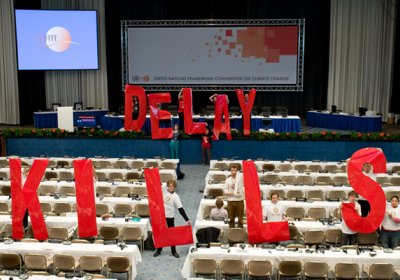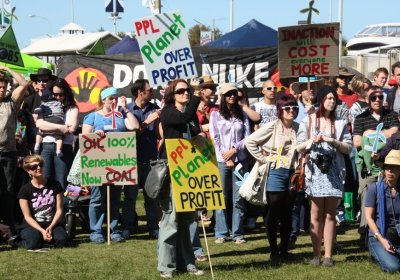It’s close to an article of faith among environmentalists that using less energy is a big part of the solution to climate change. Energy efficiency is often said to be the “low hanging fruit” of climate policy.
On face value, the benefits seem obvious.
The knowledge needed to make big gains in efficiency already exists. Using less energy will save consumers and industry money, whereas other policies will be costly. And most importantly, lower energy use could make a big dent in global greenhouse gas emissions.
Environment
There is something rotten in the state of Victoria. The legacy of secrecy in government reached a high point under Jeff Kennett’s Coalition state government in the 1990s. It continued under the Bracks Labor government and the current John Brumby Labor government. The main reason for this was widespread privatisation and the policy of funding infrastructure projects through public-private partnerships (PPPs) — a policy begun by the Kennett government and continued by Labor.
In “The Return of Dr Strangelove”, a September 6 lecture hosted by Melbourne University and Beyond Zero Emissions (BZE), Clive Hamilton, author of Affluenza, Scorcher and Requiem for a Species gave a short history of the research and investment in geo-engineering solutions to global warming.
A move from fossil fuels to renewable energy is the logical “Plan A” response to human-caused climate change, but such a response would threaten corporate profits.
One hundred activists protested on the steps of the Victorian parliament on October 6 to demand the Victorian desalination plant at Wonthaggi be scrapped.
Stephen Cannon of Watershed Victoria, which organised the protest, said the Brumby government had provided no reliable costing of the project.
Cannon said users could be paying six times the cost of ordinary water if the project went ahead. The project would line the pockets of corporations for generations at the expense of the people of Melbourne.
The fight against the dumping of toxic waste off the coast of Madang in Papua New Guinea suffered a setback when a court injunction against the Ramu nickel mine, which is building a pipe to dump its waste into the ocean, was reversed.
The injunction was dropped after the three remaining plaintiffs pulled out of the case against the US$1.4 billion Chinese-owned mine, the September 24 Sydney Morning Herald said.
On October 10, the international day of climate action, climate activists will converge on Hazelwood, Australia’s dirtiest power station.
Each year, Hazelwood burns 17 million tonnes of brown coal and consumes 27 million litres of water (the equivalent of using one month’s worth of Melbourne’s water supply every day). It accounts for 15% of Victoria’s emissions and 3% of Australia’s emissions.
On September 26, protesters from climate change activist group Rising Tide shut down the world’s largest coal port at Newcastle. Green Left Weekly’s Zane Alcorn interviewed Rising Tide member Annika Dean.
* * *
What happened at the protest?
On the surface, Labor PM Julia Gillard appears to have done an about-face on climate change in the weeks since Labor scraped back into government. Immediate action on climate change — especially setting a carbon price — is back on the agenda, she says.
The Labor minority government has given in to a Greens demand for a new parliamentary committee on climate change. In doing so, Labor appears to be backing away from its pre-election promise to delay new climate legislation until 2013.
The call to put "a price on carbon" has gained wide support in Australia. It has also gained new currency in the context of a minority Labor government formed with support from the Greens and three independents.
Support for a price on carbon has come from across the political spectrum — from the Liberal Party's Malcolm Turnbull through to grassroots climate activists.
Green Left Weekly’s Simon Butler asked five Australian climate activists if they thought a carbon price was good policy and should be supported by climate action movement.
Prominent Australian writer and climate action advocate Clive Hamilton will speak in a feature session at the October 2-3 Sydney Festival of Dangerous Ideas on the topic: “We are all climate change deniers.”
He spoke to Green Left Weekly’s Simon Butler about climate denial, carbon pricing, population levels, and that “Oh shit” moment about climate change.
* * *
Into the Woods: The Battle for Tasmania’s Forests
by Anna Krien, BlackInc, 2010, 304 pages, $29.95
REVIEW BY TIM DOBSON
“I was the premier of Tasmania but these bastards were infinitely more powerful than me. You’ve no idea how powerful they are. I couldn’t move. For God’s sake, keep fighting them. That’s why I’m ringing you, they have to be stopped.”
Two weeks before his death, former Tasmanian Labor premier Jim Bacon, said these words in a phone call to well-known anti-pulp mill campaigner and ABC TV’s Gardening Australia host Peter Cundall.
Thirty people gathered at Sandon Point's Aboriginal Tent Embassy (SPATE) on September 23 in a show of opposition to the reported destruction of native bushland and Aboriginal artefacts over the past two weeks by developer Stockland.
Activists conducted a non-violent direct action workshop and hung banners on a highway bridge at the bottom of Bulli Pass.
- Previous page
- Page 276
- Next page











